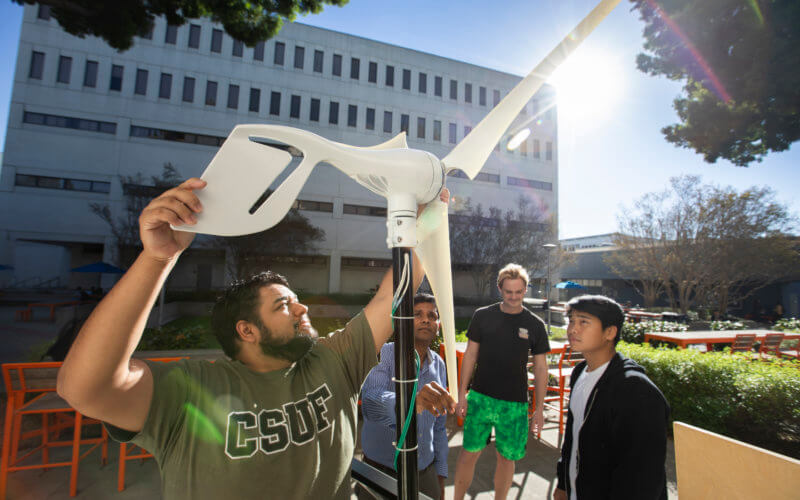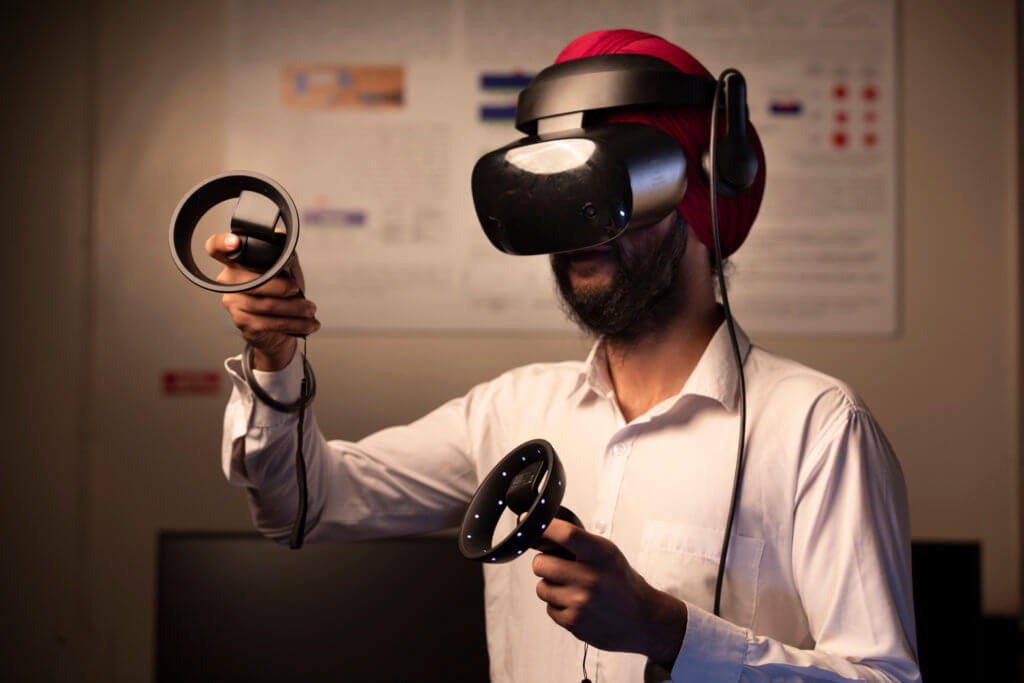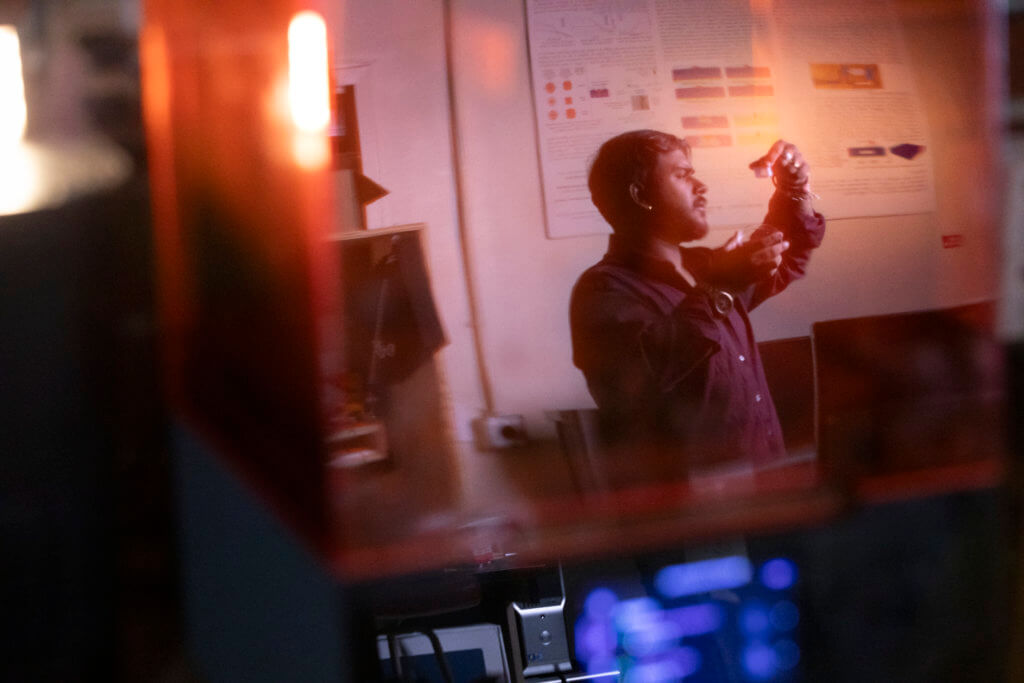
Mechanical engineering major Matthew Lindwall is working on a manufacturing project to reduce carbon emissions in transportation by using “green” hydrogen as a clean energy source.
Classmate Rahul Pashpuleti is developing a 3D-printed artificial meniscus made of biodegradable and environmentally friendly materials to replace damaged knee cartilage.
As today’s manufacturers realize financial and environmental benefits from eco-friendly business practices, these Cal State Fullerton students are learning about green technology, often called “greentech,” and sustainable manufacturing to help shape the industry’s future.
Sagil James, associate professor of mechanical engineering, and his research students are engaged in various pioneering projects — some sponsored by industry partners — that focus on trends and sustainable manufacturing methods.
“Greentech is a forward-looking approach that places environmental responsibility and resource efficiency at the forefront of industrial processes,” James said. “It involves minimizing carbon emissions, reducing waste and efficiently managing resources, including a shift toward renewable energy sources and eco-friendly materials.”
This approach is vital for environmental stewardship, cost savings, competitive advantage, regulatory compliance and ensuring the availability of resources for future generations.
“Greentech manufacturing drives innovation, enhances employee satisfaction and supports a sustainable, greener future for the industry and the planet,” James added.
Lindwall, a senior, and Pashpuleti, a graduate student, are among James’ students working on real-world projects focusing on cutting-edge technologies and practices in eco-manufacturing, clean energy manufacturing and cyber-manufacturing.
Students also gain a strong foundation in sustainable manufacturing principles through coursework in the College of Engineering and Computer Science, equipping them with the skills and knowledge needed to thrive in the industry after graduation.

Additionally, more than 400 students, faculty and industry partners attended the recent Titan Manufacturing Day. The Orange County Department of Education K-16 collaborative grant and student organization Society of Manufacturing Engineers supported the event.
“I’m interested in green and sustainable manufacturing because I believe that humanity is, in general, seeking a ‘greener’ future, meaning that all aspects of our lives are going to involve more environmentally sustainable practices,” said Lindwall, who is leading a team of nine students on their “Titan Green” project.
Pashpuleti, who is from Bangalore, Karnataka, India, is intrigued by the potential of sustainable manufacturing to revolutionize the production of goods.
“The idea of creating environmentally friendly and cost-effective products is exciting. This emerging industry aligns with my passion for innovation and sustainability, which makes it a perfect fit for my career goals.”
Students Explore Green Projects
Lindwall and his Titan Green team of mechanical engineering majors are working on developing a hydrogen-powered, remote-controlled speed boat. The team’s project will be a proof-of-design concept for life-size boats.
Green hydrogen involves the generation of zero-emissions hydrogen fuel using renewable energy sources, such as wind and solar power. Using hydrogen as a fuel source is crucial to a sustainable future, Lindwall said.
Through efficient integration of renewable energy, the project intends to set a sustainable precedent for the transportation sector while promoting public awareness of the potential of green hydrogen.
“This endeavor represents a vital step toward a more eco-friendly and carbon-neutral future for transportation,” he said. “Maritime applications of hydrogen energy represent a new design frontier — and we want to be one of the first to explore it.”

Pashpuleti uses bioprinting technology, in which biomaterials are mixed with cells to construct living tissues like a meniscus.
“Bioprinting uses a 3D printer with living cells to build tissues and organs layer-by-layer, offering hope for organ transplants and medical research breakthroughs,” he said.
Amarjeet Singh, a mechanical engineering graduate student, is working on an augmented reality research project to fuse the innovative potential of this technology with manufacturing processes to advance sustainable manufacturing principles.
The project explores the seamless integration of AR-enhanced cognitive ergonomics into manufacturing, offering real-time visual guidance, data overlays and interactive checklists to assist workers in their tasks.
“By incorporating AR-enhanced cognitive ergonomics, the project addresses fundamental principles such as resource efficiency, the adoption of eco-friendly technology, workforce training, safety improvements and reduction of environmental impact,” James said.
“The goal is to establish a model for the future, where technology-driven manufacturing seamlessly harmonizes innovation, safety and sustainability, fostering an efficient and environmentally responsible industry.”
Preparing Students for the Green Workforce
The demand for professionals versed in sustainability, renewable energy and environmental management is rising, making it a dynamic and promising field for those passionate about sustainable practices and environmental responsibility, James relayed.
Lindwall plans to pursue a career working at a water or power company and looks forward to incorporating sustainable practices.
“This research experience and coursework prepares us for the workforce because it gives us a better understanding of the engineering process — from ideas to schematics to a finished project and everything in between,” Lindwall said. “It also gives us an idea of what it will be like to work as part of a team on such projects.”
In his future career, Pashpuleti also hopes to make a positive impact on the environment and society.
“My research and coursework have equipped me with the technical skills and knowledge needed for a career in sustainable manufacturing,” he said. “I’ve learned how to develop and implement green manufacturing processes that are valuable skills in today’s environmentally conscious industries.”